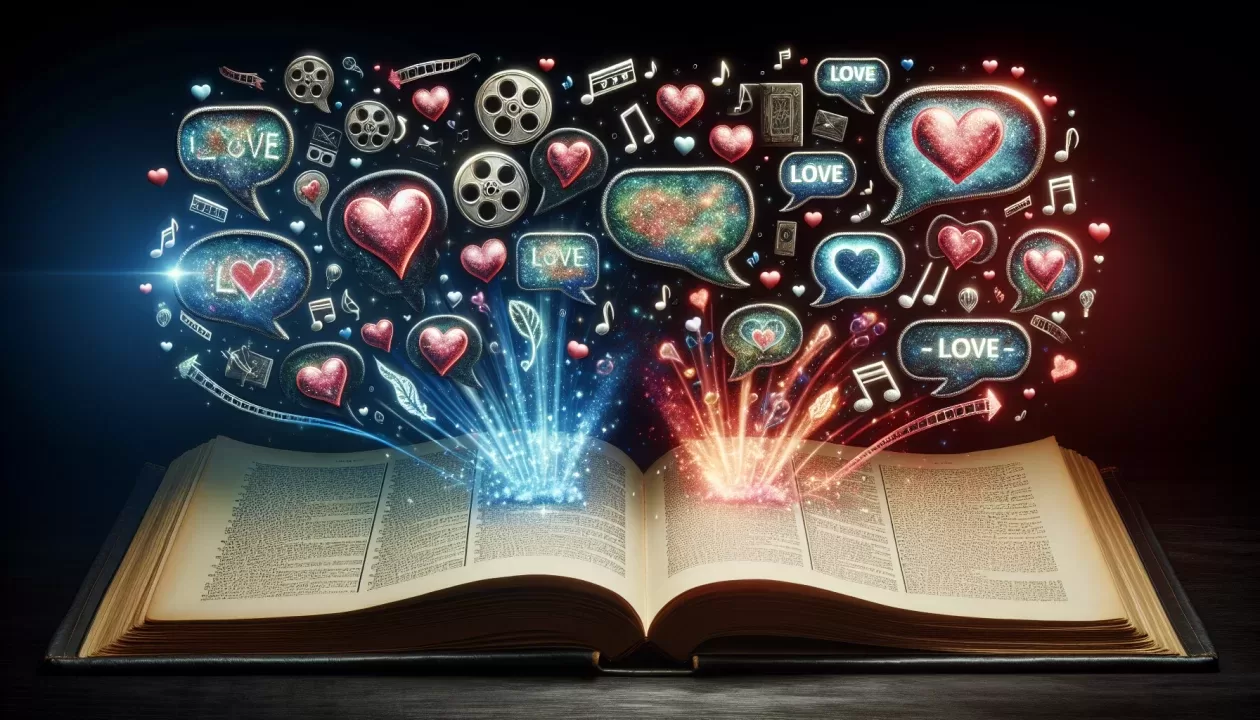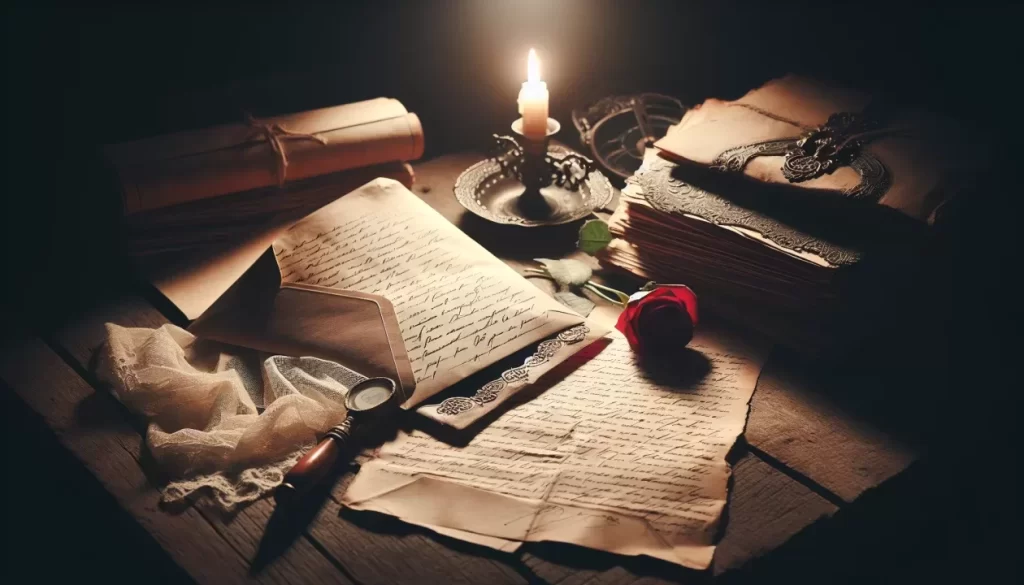In the fast-paced world of today, where social media and popular culture reign supreme, it’s no surprise that romantic quotes hold a special place in our hearts. From movies to music, these words of love and longing have the power to shape our view of what it means to be in love. Whether it’s the iconic “You complete me” from Jerry Maguire or the bittersweet “Love is a battlefield” from Pat Benatar, these memorable quotes have a way of capturing the essence of romance and making us believe in the power of love. Let’s explore the impact of romantic quotes in pop culture and how they influence our perception of love.
The Influence of Romantic Quotes in Pop Culture
Introduction
Romantic quotes have long been a staple in pop culture, captivating audiences with their ability to evoke powerful emotions and depict the complexities of love. From literature and film to social media and music, these quotes have become deeply ingrained in society, shaping our view of love and influencing our relationships. This article explores the historical context of romantic quotes, their role in shaping our perceptions of love, the most iconic quotes in pop culture, their emotional impact, critiques and controversies surrounding them, and how we can navigate their influence in our own lives.
The Power of Media
Media plays a significant role in shaping our thoughts, beliefs, and attitudes, and romantic quotes are no exception. Through various forms of media, such as books, movies, television shows, and social media, these quotes have the power to reach millions of people, leaving a lasting impression on their perceptions of love. The widespread accessibility and popularity of media platforms make it easier than ever for romantic quotes to permeate society and influence our collective mindset.
The Popularity of Romantic Quotes
Romantic quotes have gained immense popularity in recent years, with countless websites, blogs, and social media accounts dedicated to curating and sharing these quotes. They have become a form of self-expression, with individuals using them to convey their emotions, communicate their desires, or simply captivate their audience. The ease of sharing and consuming these quotes has contributed to their proliferation and further solidified their place in pop culture.
The Effect on Society
The influence of romantic quotes on society is far-reaching, deeply embedded in our cultural consciousness. These quotes shape our ideas about love, relationships, and even our own self-perceptions. They can inspire hope and optimism, but they can also create unrealistic expectations and perpetuate harmful gender stereotypes. Society often looks to romantic quotes as a guide for what love should look like, leading to both positive and negative implications for individuals and society as a whole.
Implications on Relationships
Our understanding of love and relationships is heavily influenced by the romantic quotes we encounter in pop culture. These quotes shape our expectations, influencing our behavior and decisions within relationships. They can foster unhealthy relationship dynamics, such as the belief that true love conquers all or that one should sacrifice everything for love. It is crucial to critically assess the influence of romantic quotes and strive for healthy, balanced relationships based on mutual respect and understanding.
Historical Context of Romantic Quotes in Pop Culture
Early Depictions of Love in Literature
Romantic quotes find their roots in the early depictions of love in literature. From Shakespearean sonnets to epic love poems, authors throughout history have penned profound and enduring words about the nature of love. These quotes not only captured the essence of human emotions but also shaped societal ideals of love, often portraying it as passionate, all-consuming, and transformative.
Love in Film and Television
The advent of film and television brought love to life on the screen, making it more accessible and relatable to audiences worldwide. Romantic quotes from iconic movies and TV shows have become ubiquitous, etching themselves into our cultural lexicon. From “You complete me” in Jerry Maguire to “I’ll never let go, Jack” in Titanic, these quotes have left an indelible mark on popular culture, influencing how we perceive and understand love.
The Emergence of Celebrity Culture
As celebrity culture grew in prominence, so did the influence of romantic quotes shared by famous individuals. The public’s fascination with celebrities and their relationships created a demand for their insights and expressions of love. Celebrity couples like Beyoncé and Jay-Z, who famously declared “Love is an endless act of forgiveness,” have contributed to the proliferation of romantic quotes in pop culture, solidifying their place as cultural touchstones.
The Rise of Social Media
Social media platforms have given rise to a new wave of romantic quotes, allowing individuals to effortlessly express themselves and share their thoughts on love. Platforms like Instagram and Twitter have become breeding grounds for curated feeds filled with inspirational and romantic quotes. Influencers and celebrities alike frequently share their relationship advice or feelings through succinct and shareable quotes, which can quickly spread and shape the perception of love among their followers.
The Role of Romantic Quotes in Shaping Our View of Love
Creating Unrealistic Expectations
Romantic quotes often paint an idealistic and picture-perfect version of love, creating unrealistic expectations for relationships. These quotes may perpetuate the belief that love is always passionate, effortless, and devoid of conflict. As a result, individuals may feel inadequate or dissatisfied when their own relationships fail to mirror these idealized depictions of love. It is essential to recognize that real love is multifaceted and requires effort, compromise, and growth.
Perpetuating Gender Stereotypes
Many romantic quotes reinforce traditional gender stereotypes, portraying men as knights in shining armor and women as damsels in distress. These stereotypes can limit our understanding of love and perpetuate harmful narratives that undermine gender equality. It is important to challenge these portrayals and embrace diverse and inclusive perspectives on love, recognizing that everyone’s experiences and expressions of love are unique.
Promoting an Idealized Version of Love
Romantic quotes often present an idealized version of love, focusing on grand gestures and sweeping declarations rather than the everyday realities of a committed relationship. While these quotes can be inspiring and uplifting, they may overshadow the quieter, less dramatic expressions of love that occur in everyday life. It is crucial to appreciate the small gestures and nuances that make up a healthy and fulfilling relationship.
Influence on Self-Perception and Identity
The constant exposure to romantic quotes can shape our self-perception and identity. Individuals who are single or struggling in their love lives may internalize these quotes and believe that something is wrong with them or that they are incomplete without a romantic partner. It is important to remember that self-worth is not dependent on romantic relationships and to cultivate a sense of self-love and fulfillment independent of societal expectations.

The Most Iconic Romantic Quotes in Pop Culture
Classic Literature and Poetry
Classic literature and poetry have provided some of the most enduring romantic quotes in pop culture. From William Shakespeare’s timeless lines like “Shall I compare thee to a summer’s day?” to Emily Brontë’s passionate declaration “Whatever our souls are made of, his and mine are the same,” these quotes continue to resonate with readers and shape our perception of love.
Quotable Movies and TV Shows
Movies and TV shows have gifted us with numerous quotable romantic moments. From Humphrey Bogart’s “Here’s looking at you, kid” in Casablanca to Ross Geller’s famous “We were on a break!” line in Friends, these quotes have become ingrained in our collective consciousness. They invoke nostalgia, spark emotions, and offer a shared language for discussing love and relationships.
Song Lyrics and Music Videos
Music has an undeniable ability to evoke emotions, and romantic song lyrics play a significant role in tugging at our heartstrings. From timeless classics like “I Will Always Love You” by Whitney Houston to contemporary hits like “All of Me” by John Legend, these lyrics have the power to elicit strong emotional responses and provide a soundtrack for love in our lives.
Celebrity Instagram and Twitter Feeds
Celebrities have taken to social media to share their thoughts on love and relationships, using their platforms to connect with fans on a more personal level. From heartfelt Instagram captions to Twitter threads on navigating love, these quotes provide a glimpse into the romantic lives of our favorite celebrities and shape our perception of what love can be.
The Emotional Impact of Romantic Quotes
Inspiring Hope and Optimism
Romantic quotes have the power to inspire hope and optimism, reminding us of the beauty and transformative nature of love. They can uplift our spirits, especially during challenging times, and provide a ray of hope for finding true and lasting love. By resonating with our emotions, these quotes can ignite a sense of possibility and motivate us to pursue love and happiness.
Eliciting Strong Emotional Responses
The emotional impact of romantic quotes cannot be understated. They have the ability to evoke joy, longing, and even heartbreak, mirroring the vast range of emotions associated with love. Whether it is a tear-inducing quote that encapsulates the pain of unrequited love or a heartwarming quote that captures the bliss of newfound romance, these quotes elicit deeply felt emotional responses.
Creating a Sense of Belonging
Romantic quotes create a sense of belonging by reminding us that our experiences of love are shared by others. They possess an inherent relatability, serving as emotional touchstones that connect individuals across time and space. By providing a common language to express emotions and experiences, these quotes foster a sense of community and solidarity in matters of the heart.
Providing Comfort and Solace
In moments of heartache or uncertainty, romantic quotes can provide comfort and solace. They offer a source of solace by validating our experiences and emotions, reassuring us that we are not alone in our struggles. These quotes can provide the strength and perspective needed to navigate the complexities of love, reminding us that love, like life, is both beautiful and challenging.
Critiques and Controversies Surrounding Romantic Quotes
Promoting Unhealthy Relationship Dynamics
One of the main critiques of romantic quotes is their tendency to promote unhealthy relationship dynamics. Quotes that romanticize possessiveness, jealousy, or toxic behavior can reinforce harmful patterns and undermine healthy relationship boundaries. It is important to critically examine these quotes and prioritize relationships based on mutual respect, trust, and equality.
Excluding Non-Normative Love
Many romantic quotes fail to acknowledge and celebrate the diversity of love beyond traditional heterosexual relationships. By predominantly depicting romantic love between a man and a woman, these quotes can marginalize and invalidate non-normative forms of love. It is essential to seek out and uplift quotes that embrace and reflect the full spectrum of love and relationships.
Neglecting the Complexities of Love
Romantic quotes often simplify the complexities of love, reducing it to grand gestures and sweeping declarations. In reality, love encompasses a vast range of emotions, experiences, and challenges. Quotes that oversimplify love can undermine our understanding of its nuanced nature and fail to prepare us for the realities of maintaining healthy, long-term relationships.
Commercialization and Manipulation of Love
The commodification of love is a significant critique surrounding romantic quotes in pop culture. Quotes that are used solely for marketing purposes or to sell products can reduce love to a transactional concept, devaluing its profound emotional and spiritual significance. It is important to be mindful of the commercial intentions behind certain quotes and prioritize genuine connections over consumerism.
Understanding and Challenging the Influence of Romantic Quotes
Developing Media Literacy
To challenge the influence of romantic quotes, it is important to develop media literacy skills. This involves critically assessing the messages conveyed by media and understanding the motives behind these messages. By questioning the romantic quotes we encounter and considering their broader implications, we can navigate their influence more consciously and make informed choices about the love narratives we consume.
Exploring Diverse Narratives
To broaden our understanding of love, it is crucial to seek out diverse narratives and perspectives. This involves actively seeking out quotes that depict love in different contexts, such as LGBTQ+ relationships, long-distance relationships, or unconventional forms of love. By exposing ourselves to a variety of love stories, we can challenge preconceived notions and embrace the richness and diversity of love.
Promoting Authenticity and Emotional Intelligence
Challenging the influence of romantic quotes requires promoting authenticity and emotional intelligence in our relationships. Instead of striving for an idealized version of love, it is important to prioritize open communication, empathy, and vulnerability. By fostering genuine and healthy connections, we can navigate the complexities of love with greater understanding and fulfillment.
Encouraging Open Conversations About Love
Open conversations about love are essential in challenging the influence of romantic quotes. By engaging in conversations about the realities, complexities, and challenges of love, we can challenge idealized narratives and create space for diverse perspectives. Sharing personal experiences, insights, and understanding can help counteract the one-size-fits-all narratives often perpetuated by romantic quotes.
The Evolution of Romantic Quotes in Pop Culture
Moving Towards More Realistic Representations
As conversations around representation and authenticity continue to evolve, there is a growing demand for more realistic representations of love in pop culture. This shift towards embracing the complexities and diversity of love allows for more relatable and nuanced quotes. By incorporating the realities of love into pop culture, we can create a more inclusive and empathetic understanding of relationships.
Incorporating Diversity and Inclusivity
In recent years, there has been a concerted effort to incorporate diversity and inclusivity in romantic quotes. Quotes that celebrate love in all its forms, regardless of gender, race, or sexual orientation, are gaining prominence. This shift is essential in challenging traditional norms and fostering acceptance and understanding of non-normative love.
Embracing Vulnerability and Imperfection
The emphasis on vulnerability and imperfection is becoming more prevalent in romantic quotes. Rather than glorifying flawless love stories, quotes that embrace the messiness, growth, and imperfections of love are gaining traction. By acknowledging the challenges and growth opportunities that come with relationships, these quotes foster a more authentic and compassionate view of love.
Balancing Escapism with Authenticity
The evolution of romantic quotes in pop culture strikes a delicate balance between escapism and authenticity. While quotes can provide temporary relief from reality and transport us to a world of idealized love, they are also increasingly incorporating more authentic and relatable experiences. This balance allows for both moments of escapism and grounding in the realities of love.
Conclusion
Romantic quotes have long held a significant place in pop culture, shaping our view of love and relationships. From their historical origins in literature to their modern-day presence in social media feeds, these quotes exert a profound influence on society. While they can inspire hope and connect us through shared experiences, it is crucial to approach them critically and navigate their influence with awareness. By embracing diverse narratives, promoting authenticity, and engaging in open conversations about love, we can challenge the influence of romantic quotes and create a more inclusive, empathetic, and fulfilling understanding of love in pop culture and our own lives.

